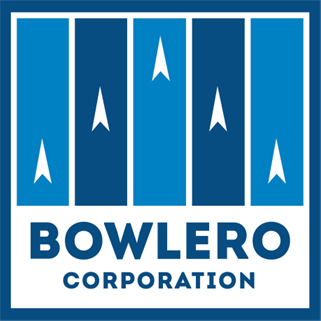
Research News and Market Data on BOWL
02/15/2023
- Revenue was a record-breaking $273.4 million in the second quarter, growing $68.2 million, or 33.2%, year-over-year, and $88.5 million, or 47.9%, relative to the corresponding pre-pandemic period.1 Same-store revenue increased $54.4 million, or 27.3%, year-over-year, and grew $53.9 million, or 30.2%, vs. the comparable pre-pandemic period.2
- Net income in the second the quarter was $1.4 million, impacted by the non-cash expense related to the revaluation of the earnout shares ($30.8 million). Adjusted for this non-cash expense, Normalized Net Income was $32.2 million.
- Adjusted EBITDA in the second quarter was $97.0 million, $30.2 million, or 45.2%, higher vs. the prior year’s quarter, and $44.1 million, or 83.3%, higher relative to pre-pandemic performance.
- Trailing Twelve Month (TTM) Revenue was $1.03 billion, a high watermark in the Company’s history. The TTM Revenue was $151 million or 17% higher than the corresponding projection provided in the December 2021 go-public transaction.
- TTM Adjusted EBITDA was $353.0 million with a 34.3% margin and increased $158 million or 80.8% compared to prior year TTM period.
- MoneyBowl™, the Company’s proprietary skill-based gamification app, is active in 37 centers as of February 15, 2023, which represents over 11% of the center population.
- The Company added 8 new centers during the quarter. Total centers in operation as of January 1, 2023 were 326. Subsequent to the quarter-end, the Company acquired an additional 1 center bringing the updated center count to 327, and signed leases for another 6 locations to be newly constructed.
RICHMOND, Va.–(BUSINESS WIRE)– Bowlero Corp. (NYSE: BOWL) (“Bowlero” or the “Company”), the world’s largest owner and operator of bowling centers, today provided financial results for the second quarter of the 2023 fiscal year, which ended on January 1, 2023. Bowlero announced revenue of $273.4 million, which was driven by dramatic growth in event revenue and a solid increase in walk-in-retail and league revenue. Event Revenue grew 74% ($29.6 million) vs. the prior year’s quarter and 59% ($25.8 million) vs. the pre-pandemic quarter. Total revenue grew by 33.2% on a year-over-year basis and 47.9% compared to pre-pandemic performance. Same-store sales rose by 27.3% year-over-year and 30.2% relative to pre-pandemic quarter.
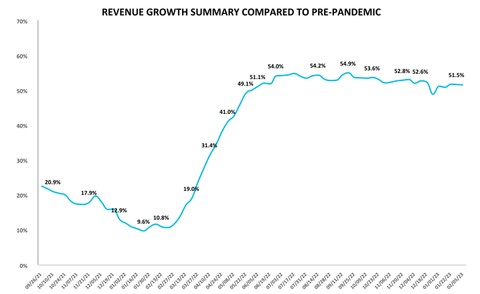
Bowling Center Trailing 13-week Revenue Growth Trend (Graphic: Business Wire)
“The Company’s second quarter top-line and bottom-line growth was extraordinary. The re-investment in our people that we made in the first quarter prepared us for a record holiday season that delivered on every facet. Event Revenue continued to drive revenue growth with event sales up $30 million over prior year’s quarter, more than offsetting the estimated $10 million loss in revenue due to the emergence of the COVID-19 Omicron variant in the prior year,” said Thomas Shannon, Founder and Chief Executive Officer. “The future for the Company is as bright as ever. In addition to record financial performance in the quarter, we continue to achieve exciting milestones, including surpassing $1.0 billion in TTM revenue, $350 million in TTM Adjusted EBITDA, and rolling out MoneyBowl™, our entirely in-house gamification app to 37 centers and counting, which we anticipate will revolutionize how bowlers interact with the lanes.”
Second-Quarter 2023 Operating Results
Tremendous growth in Revenue during the second quarter, totaling $273.4 million, up 33.2% on a year-over-year basis, and up 47.9% relative to pre-pandemic performance. Same-store sales increased 27.3% year-over-year, demonstrating the Company’s ability to continue to drive organic growth.
Net income for the quarter was $1.4 million, after giving effect to $30.8 million of non-cash expenses related to the increase in the fair value of earnouts. In the prior year, Net loss for the quarter was $34.5 million, driven primarily by non-recurring expenses related to the successful de-SPAC transaction net of the non-cash decrease in expenses related to fair value of the earnouts ($48.9 million). Adjusted for the non-cash expense, normalized Net Income was $14.4 million in the prior year’s quarter. Normalized Net Income increased $17.8 million or 123.1% vs. the prior year’s quarter. Adjusted EBITDA for the quarter was $97.0 million, up 45.2% year-over-year and 83.3% relative to pre-pandemic performance.The Company was able to expand margin as a result of the QMS’s tech-enabled financial performance optimization tool and operating leverage from higher revenue generation in the quarter.
Brett Parker, President and CFO of Bowlero, said, “We had a fantastic quarter. The second quarter’s margin improvement was the result of our relentless pursuit of operating leverage in the business while simultaneously driving sales in order to maximize EBITDA. Through our proprietary, algorithmic-based technology toolkit, management remained hyper-focused on maximizing both revenue and profit. We had a strong and balanced performance across all segments of our bowling business–walk-in retail, leagues, and events–and saw robust demand throughout the quarter.”
Financial Position
As of January 1, 2023, cash, cash equivalents, and restricted cash totaled $89.8 million and total debt was $887.7 million, resulting in net debt of $797.9 million. At the end of the second quarter of 2023, Bowlero’s Net Leverage Ratio was 2.3x TTM Adjusted EBITDA. For the second quarter of 2023, Net Cash provided by operating Activities was $80.3 million, and Net Cash generated from Adjusted Operating Activities was $106.0 million when adjusted for the $25.7 million in interest expense paid in cash.
Share Repurchase Program
The Company repurchased 629,677 shares of Class A common stock during the second quarter at an average price of $12.62, bringing the total shares repurchased to 4,528,447 shares (average price per share of $10.59) and bringing the total Class A and Class B shares outstanding down to 162.4 million as of January 1, 2023. The Company has now repurchased more than 100% of the shares issued as a result of the warrant redemption in May 2022. Bowlero has $146.6 million of share repurchase authorization remaining as of January 1, 2023.
Bowling Center Trailing 13-week Revenue Growth Trend3
[Please see the Bowling Center Trailing 13-week Revenue Growth TrendChart]
Investor Webcast Information
Listeners may access an investor webcast hosted by Bowlero. The webcast and results presentation will be accessible at 4:30 PM ET on February 15, 2023 in the Events & Presentations section of the Bowlero Investor Relations website at https://ir.bowlerocorp.com/overview/default.aspx.
About Bowlero Corp.
Bowlero Corp. is the worldwide leader in bowling entertainment. With more than 325 bowling centers across North America, Bowlero Corp. serves nearly 30 million guests each year through a family of brands that includes Bowlero and AMF. Bowlero Corp. is also home to the Professional Bowlers Association, which boasts thousands of members and millions of fans across the globe. For more information on Bowlero Corp., please visit BowleroCorp.com.
Forward Looking Statements
Some of the statements contained in this press release are forward-looking statements within the meaning of Section 27A of the Securities Act of 1933, as amended, and Section 21E of the Securities Exchange Act of 1934, as amended. These forward-looking statements are generally identified by the use of words such as “anticipate,” “believe,” “could,” “estimate,” “expect,” “intend,” “may,” “plan,” “potential,” “predict,” “project,” “should,” “target,” “will,” “would” and, in each case, their negative or other various or comparable terminology and include preliminary results. These forward-looking statements reflect our views with respect to future events as of the date of this release and are based on our management’s current expectations, estimates, forecasts, projections, assumptions, beliefs and information. Although management believes that the expectations reflected in these forward-looking statements are reasonable, it can give no assurance that these expectations will prove to have been correct. All such forward-looking statements are subject to risks and uncertainties, many of which are outside of our control, and could cause future events or results to be materially different from those stated or implied in this document. It is not possible to predict or identify all such risks. These risks include, but are not limited to: the impact of COVID-19 or other adverse public health developments on our business; our ability to grow and manage growth profitably, maintain relationships with customers, compete within our industry and retain our key employees; changes in consumer preferences and buying patterns; the possibility that we may be adversely affected by other economic, business, and/or competitive factors; the risk that the market for our entertainment offerings may not develop on the timeframe or in the manner that we currently anticipate; general economic conditions and uncertainties affecting markets in which we operate and economic volatility that could adversely impact our business, including the COVID-19 pandemic and other factors described under the section titled “Risk Factors” in the Company’s Annual Report on Form 10-K filed with the U.S. Securities and Exchange Commission (the “SEC”) by the Company on September 15, 2022, as well as other filings that the Company will make, or has made, with the SEC, such as Quarterly Reports on Form 10-Q and Current Reports on Form 8-K. These factors should not be construed as exhaustive and should be read in conjunction with the other cautionary statements that are included in this press release and in other filings. We expressly disclaim any obligation to publicly update or review any forward-looking statements, whether as a result of new information, future developments or otherwise, except as required by applicable law.
Non-GAAP Financial Measures
To provide investors with information in addition to our results as determined under Generally Accepted Accounting Principles (“GAAP”), we disclose net income, normalized for extraordinary and non-recurring items, cash generated from Adjusted Operating Activities, net, Adjusted EBITDA, and trailing twelve month Adjusted EBITDA as “non-GAAP measures” that management believes provide useful information to investors because each measure assists both investors and management in analyzing and benchmarking the performance and value of our business. Accordingly, management believes that these measurements are useful for comparing general operating performance from period to period, and management relies on these measures for planning and forecasting of future periods. Additionally, these measures allow management to compare our results with those of other companies that have different financing and capital structures. These measures are not financial measures calculated in accordance with GAAP and should not be considered as a substitute for revenue, net income, net cash provided (used) by operating activities or any other operating performance or liquidity measure calculated in accordance with GAAP, and may not be comparable to a similarly titled measure reported by other companies.
Net income normalized for extraordinary and non-recurring items represents Net income (loss) before non-cash expenses or income related to Changes in the value of earnouts and warrants. Cash generated from Adjusted Operating Activities, net represents Net cash provided by operating activities before cash interest. Adjusted EBITDA represents Net income (loss) before Interest, Income Taxes, Depreciation and Amortization, Share-based Compensation, EBITDA from Closed Centers, Foreign Currency Exchange Loss (Gain), Asset Disposition Loss (Gain), Transactional and other advisory costs, Charges attributed to new initiatives, Extraordinary unusual non-recurring gains or losses and Changes in the value of earnouts and warrants and settlement costs. Trailing twelve month Adjusted EBITDA represents Adjusted EBITDA over the most recent twelve month period.
The Company considers net income normalized for extraordinary and non-recurring items as an important financial measure because it provides an indicator of performance that is not affected by fluctuations in certain costs or other items. However, this measure has limitations as an analytical tool, and you should not consider it in isolation or as a substitute for analysis of our results as reported under GAAP. Some of these limitations are that it does not reflect every cash expenditure and is not adjusted for all non-cash income or expense items that are reflected in our statements of cash flows.
The Company considers Cash generated from Adjusted Operating Activities, net as an important financial measure because it provides an indicator of cash flow that is not affected by how the Company finances its operations. However, this measure has limitations as an analytical tool, and you should not consider it in isolation or as a substitute for analysis of cash generation as reported under GAAP.
The Company considers Adjusted EBITDA as an important financial measure because it provides a financial measure of the quality of the Company’s earnings. Other companies may calculate Adjusted EBITDA differently than we do, which might limit its usefulness as a comparative measure. Adjusted EBITDA is used by management in addition to and in conjunction with the results presented in accordance with GAAP. Additionally, we believe trailing twelve month Adjusted EBITDA provides the current run-rate for trending purposes, rather than annualizing the respective quarters, as the Company’s business is seasonal, with the second and third fiscal quarters being higher than the first and last quarters.
We have presented Adjusted EBITDA solely as a supplemental disclosure because we believe it allows for a more complete analysis of results of operations and assists investors and analysts in comparing our operating performance across reporting periods on a consistent basis by excluding items that we do not believe are indicative of our core operating performance.
Adjusted EBITDA has limitations as an analytical tool, and you should not consider it in isolation or as a substitute for analysis of our results as reported under GAAP. Some of these limitations are that Adjusted EBITDA and trailing twelve month Adjusted EBITDA: do not reflect every expenditure, future requirements for capital expenditures or contractual commitments; do not reflect changes in our working capital needs; do not reflect the interest expense, or the amounts necessary to service interest or principal payments, on our outstanding debt; do not reflect income tax (benefit) expense, and because the payment of taxes is part of our operations, tax expense is a necessary element of our costs and ability to operate; do not reflect non-cash equity compensation, which will remain a key element of our overall equity based compensation package; and do not reflect the impact of earnings or charges resulting from matters we consider not to be indicative of our ongoing operations.
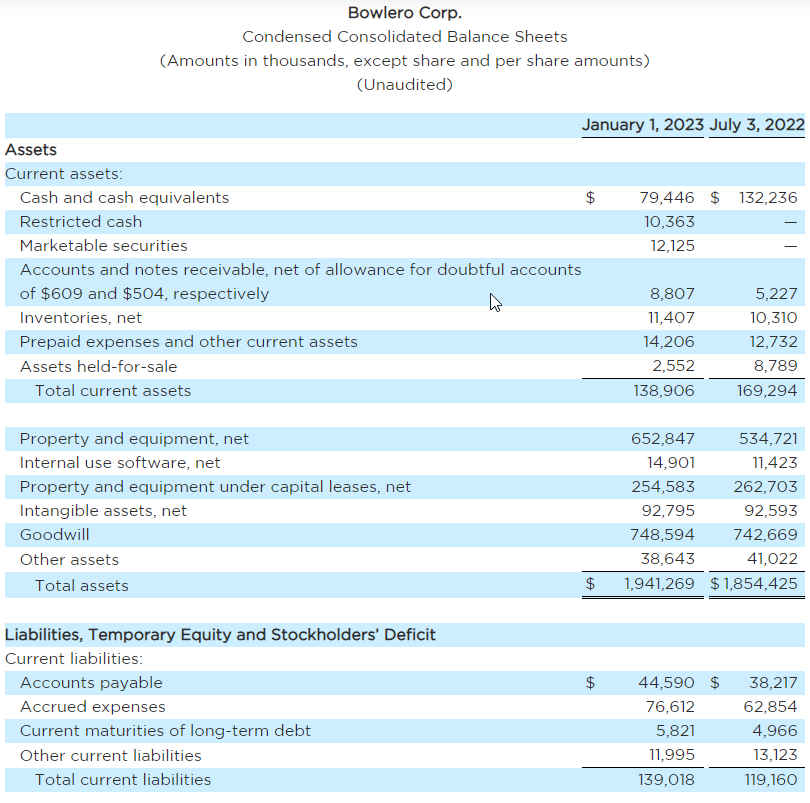
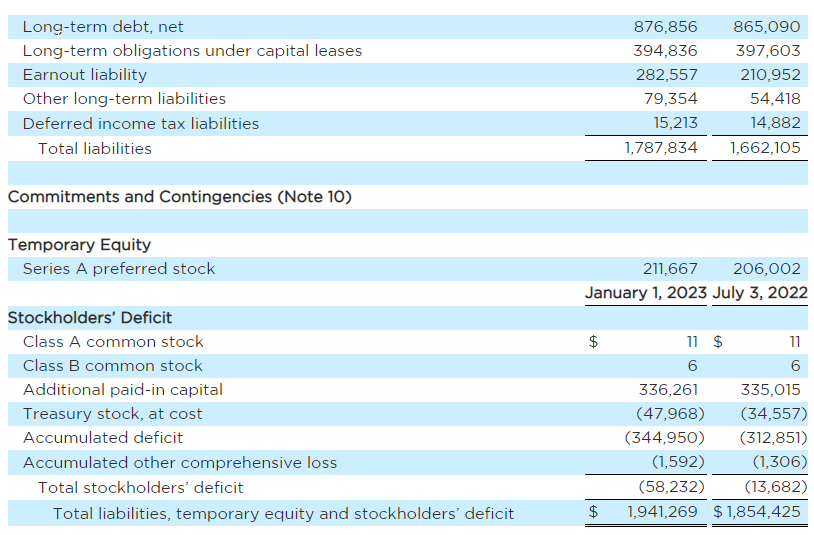
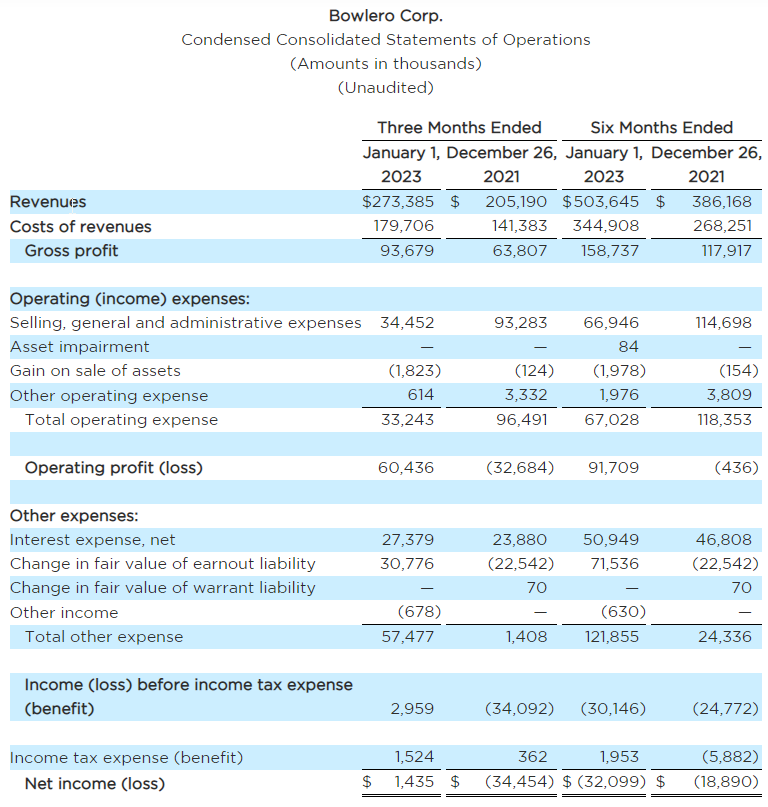
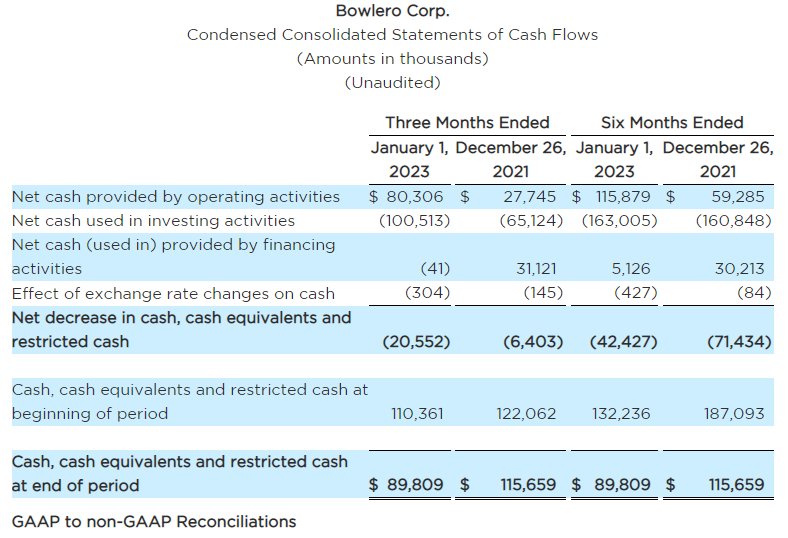
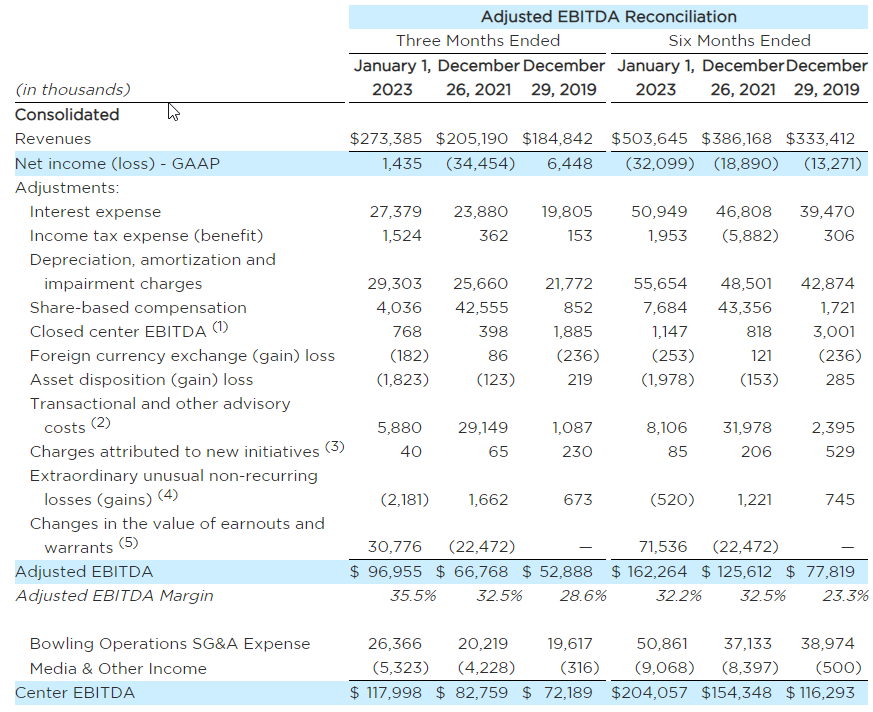
- The closed center adjustment is to remove EBITDA for closed centers. Closed centers are those centers that are closed for a variety of reasons, including permanent closure, newly acquired or built centers prior to opening, centers closed for renovation or rebranding and conversion. Closed centers do not include centers closed in compliance with local, state and federal government restrictions due to COVID-19. If a center is not open on the last day of the reporting period, it will be considered closed for that reporting period. If the center is closed on the first day of the reporting period for permanent closure, the center will be considered closed for that reporting period.
- The adjustment for transaction costs and other advisory costs is to remove charges incurred in connection with any transaction, including mergers, acquisitions, refinancing, amendment or modification to indebtedness, dispositions and costs in connection with an initial public offering, in each case, regardless of whether consummated.
- The adjustment for charges is to remove charges attributed to new initiatives include charges with the undertaking and/or implementation of new initiatives, business optimization activities, cost savings initiatives, cost rationalization programs, operating expense reductions and/or synergies and/or similar initiatives and/or programs (including in connection with any integration, restructuring or transition, any reconstruction, decommissioning, recommissioning, or reconfiguration of fixed assets for alternative uses, any office or facility opening and/or pre-opening), including any inventory optimization program and/or any curtailment, any business optimization charge, any restructuring charge (including any charges relating to any tax restructuring), any charge relating to the closure or consolidation of any office or facility (including but not limited to rent terminations, moving costs and legal costs), any systems implementation charge, any severance charge, any one time compensation charge, any charge relating to entry into a new market, any charge relating to any strategic initiative or contract, any charge relating to any entry into new markets and contracts, any lease run-off charge, any charge associated with improvements to information technology (IT) or accounting functions, losses related to temporary decreases in work volume and expenses related to maintaining underutilized personnel, any charge relating to a new contract, any consulting charge and/or any corporate development charge; provided, that, in this case of any such charge, the results of any such action relating to such charge are projected by in good faith to be achieved with 24 months of undertaking.
- The adjustment for extraordinary unusual non-recurring gains or losses is to remove extraordinary gains and losses, which include any gain or charge from any extraordinary item as determined in good faith by the Company and/or any non-recurring or unusual item as determined in good faith by the Company and/or any charge associated with and/or payment of any legal settlement, fine, judgment or order.
- The adjustment for changes in the value of earnouts and warrants is to remove the impact of the revaluation of the earnouts and warrants. As a result of the Company’s de-SPAC transaction, the Company recorded liabilities for earnouts and warrants. Changes in the fair value of the earnout and warrant liabilities are recognized in the statement of operations. Decreases in the liability will have a favorable impact on the income statement and increases in the liability will have an unfavorable impact.
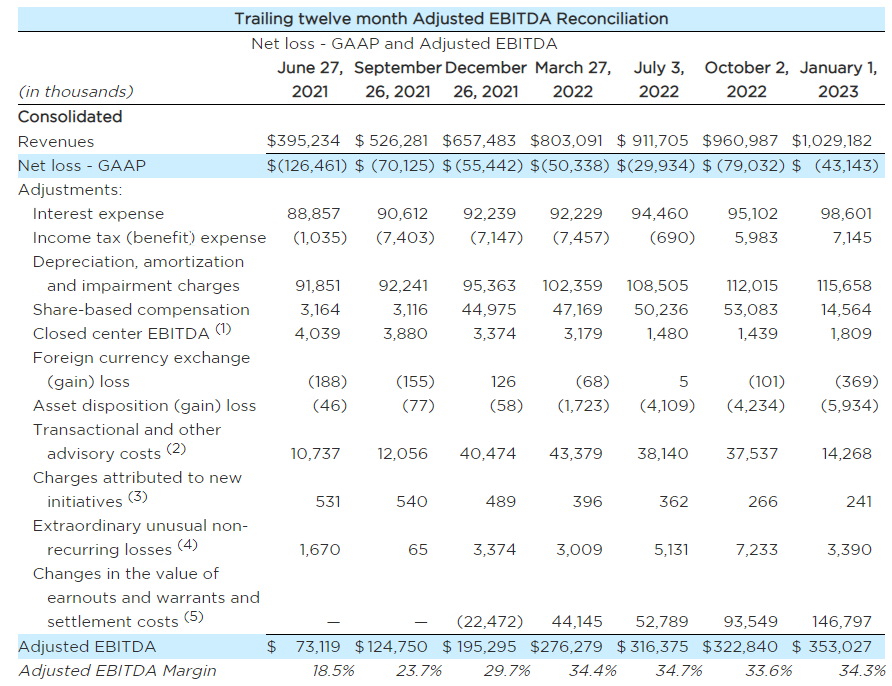
- The closed center adjustment is to remove EBITDA for closed centers. Closed centers are those centers that are closed for a variety of reasons, including permanent closure, newly acquired or built centers prior to opening, centers closed for renovation or rebranding and conversion. Closed centers do not include centers closed in compliance with local, state and federal government restrictions due to COVID-19. If a center is not open on the last day of the reporting period, it will be considered closed for that reporting period.If the center is closed on the first day of the reporting period for permanent closure, the center will be considered closed for that reporting period.
- The adjustment for transaction costs and other advisory costs is to remove charges incurred in connection with any transaction, including mergers, acquisitions, refinancing, amendment or modification to indebtedness, dispositions and costs in connection with an initial public offering, in each case, regardless of whether consummated.
- The adjustment for charges is to remove charges attributed to new initiatives include charges with the undertaking and/or implementation of new initiatives, business optimization activities, cost savings initiatives, cost rationalization programs, operating expense reductions and/or synergies and/or similar initiatives and/or programs (including in connection with any integration, restructuring or transition, any reconstruction, decommissioning, recommissioning, or reconfiguration of fixed assets for alternative uses, any office or facility opening and/or pre-opening), including any inventory optimization program and/or any curtailment, any business optimization charge, any restructuring charge (including any charges relating to any tax restructuring), any charge relating to the closure or consolidation of any office or facility (including but not limited to rent terminations, moving costs and legal costs), any systems implementation charge, any severance charge, any one time compensation charge, any charge relating to entry into a new market, any charge relating to any strategic initiative or contract, any charge relating to any entry into new markets and contracts, any lease run-off charge, any charge associated with improvements to information technology (IT) or accounting functions, losses related to temporary decreases in work volume and expenses related to maintaining underutilized personnel, any charge relating to a new contract, any consulting charge and/or any corporate development charge; provided, that, in this case of any such charge, the results of any such action relating to such charge are projected by in good faith to be achieved with 24 months of undertaking.
- The adjustment for extraordinary unusual non-recurring gains or losses is to remove extraordinary gains and losses, which include any gain or charge from any extraordinary item as determined in good faith by the Company and/or any non-recurring or unusual item as determined in good faith by the Company and/or any charge associated with and/or payment of any legal settlement, fine, judgment or order.
- The adjustment for changes in the value of earnouts and warrants is to remove the impact of the revaluation of the earnouts and warrants. As a result of the Company’s de-SPAC transaction, the Company recorded liabilities for earnouts and warrants. Changes in the fair value of the earnout and warrant liabilities are recognized in the statement of operations. Decreases in the liability will have a favorable impact on the income statement and increases in the liability will have an unfavorable impact. The adjustment also includes realized costs associated with the settlement of warrants during past reporting periods.
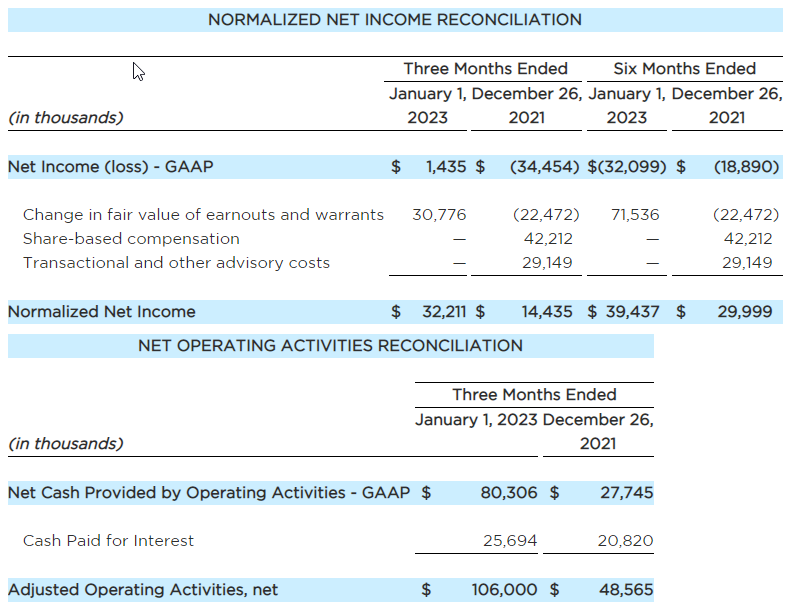
1 The pre-pandemic comparable period for quarter ended January 1, 2023 is the quarter ended on December 29, 2019.
2 Same-store sales are measured by comparing revenues for centers open for the entire duration of both the current and comparable measurement periods.
3 Revenue growth is calculated as the growth in Bowling Center Revenue compared to the comparable week during the pre-pandemic 52-week period beginning March 2019 and ending February 2020. Total Bowling Center Revenue (i) excludes media-related revenue and closed bowling centers from both current period and pre-pandemic and prior year periods and (ii) includes new bowling centers that have opened since March 2020. For weeks ending between September 26, 2021 and December 26, 2021, the percentages above are calculated by comparing each week to the comparable week in 2019. For weeks ending between January 2, 2022 and February 27, 2022, the percentages above are calculated by comparing each week to the comparable week in 2020. For weeks ending between March 6, 2022 and February 5, 2023, the percentages above are calculated by comparing each week to the comparable week in 2019. Total Bowling Center Revenue for each date is the 13-week rolling average of weekly Total Bowling Center Revenue. We use the 13-week rolling average because the revenue performance in individual weeks can be positively or negatively impacted by timing shift of holiday/sporting events, holidays moving to weekends, and extreme weather events. Data for all weeks following the close of the quarter ended on January 1, 2023 are preliminary and have not been audited or reviewed and are forward-looking statements based solely on information available to us as of the date of this announcement.
For Media:
Bowlero Corp. Public Relations
PR@BowleroCorp.com
For Investors:
Bowlero Corp. Investor Relations
IRSupport@BowleroCorp.com
Ashley DeSimone
Ashley.DeSimone@dduffyicrinc-com
Source: Bowlero Corp.
